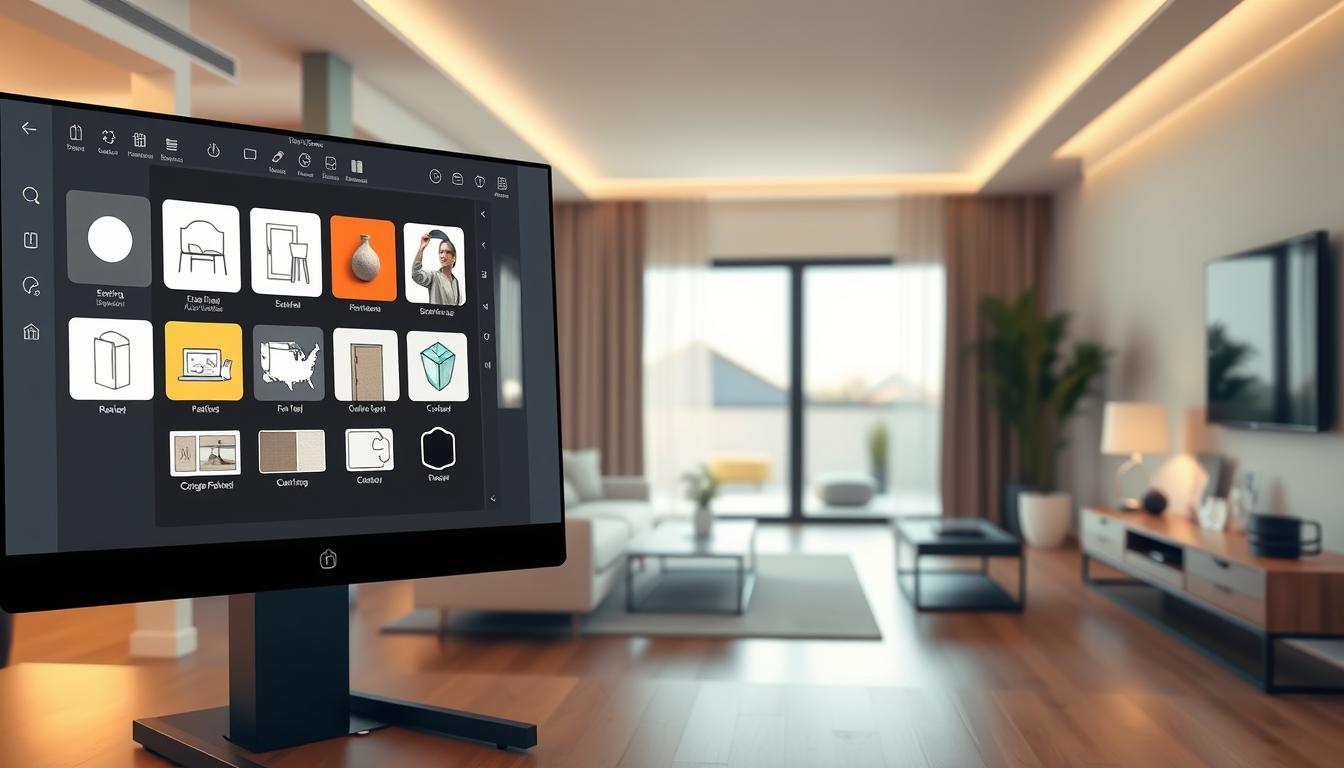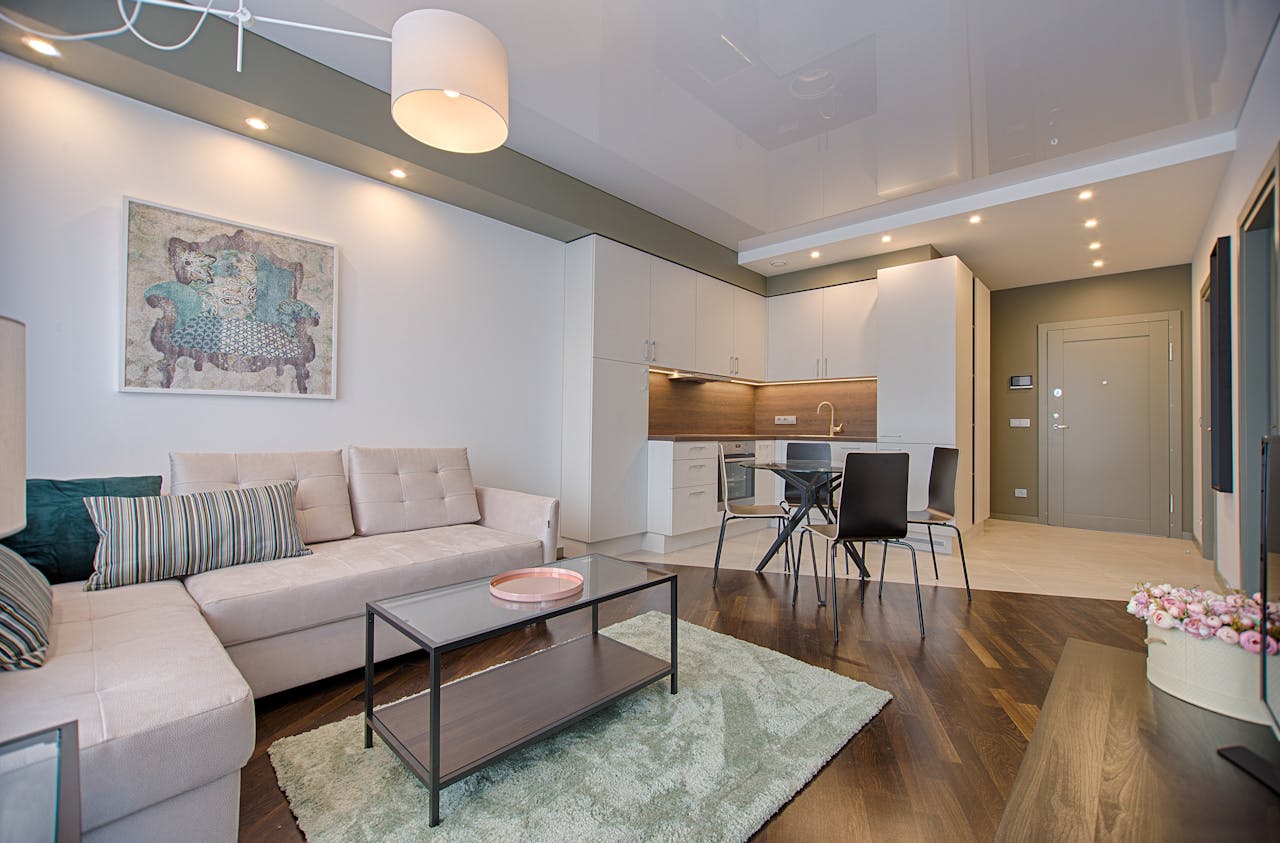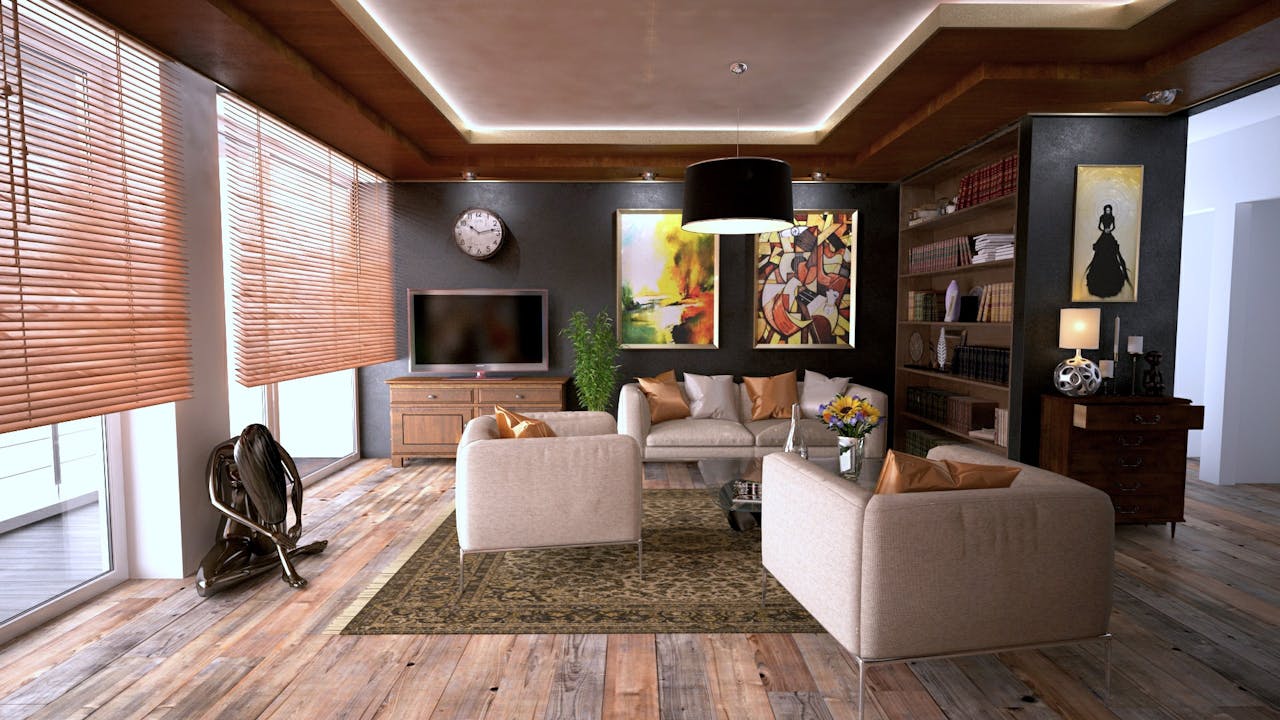Did you know the global interior design market is growing fast? This is because more people want to renovate and decorate their homes. 3D interior design software is now key for both homeowners and designers. It lets them see and plan spaces before making any changes.
There’s a big move towards digital planning. Top interior design software like Floorplanner, Chief Architect Home Designer Suite, and DreamPlan by NCH Software are leading the charge. These tools have many features and benefits. They make it simpler for users to design their dream homes.
Key Takeaways
- Top-rated 3D design software for home planning.
- Key features to look for in interior design software.
- Benefits of using digital tools for home decoration.
- Popular options for homeowners and designers.
- Factors to consider when choosing the best software.
What Is 3D Interior Design Software?
In recent years, 3D interior design software has become more popular. It’s a cost-effective way to plan and visualize interior designs. We’ll look into what it is, why it’s useful, and its key features. This will help you see how it can change your home renovation projects.
Definition and Purpose
3D interior design software lets users create virtual models of spaces. It’s great for trying out different decor and design ideas. The main goal is to let users see their ideas come to life before they start the real work.
This software is perfect for both homeowners and professionals. It helps save time and money by avoiding the mistakes that come with trial and error.
With professional interior design software, users can make detailed designs. They can try out different layouts and make changes easily. This makes the design process smoother and improves the quality of the final design.
Key Features to Look For
When picking an easy 3D design tool, look for certain features. These include:
- 2D and 3D modeling capabilities
- Extensive libraries of furniture and decor
- Advanced rendering features for realistic visualizations
- User-friendly interface for easy navigation
- Compatibility with various file formats for easy sharing and collaboration
By focusing on these features, you can find a 3D interior design software that fits your needs. It will make your design experience better. We’ll keep exploring the benefits and top choices of 3D interior design software in the next sections.
Benefits of Using 3D Interior Design Software
Using a 3D interior design tool offers many benefits, making it key in modern home design. It streamlines and makes the design process more efficient. Homeowners can enjoy a more streamlined and efficient design process with a virtual interior design program.
Visualizing Your Space
One major advantage of 3D interior design software is its ability to help you visualize your space better. With a 3D room planner app, you can create a realistic design. This makes it easier to spot problems and make changes.
Saving Time and Money
Using a 3D interior design tool can also save you time and money. You can make changes virtually, avoiding expensive mistakes. This ensures your design meets your expectations, saving you money during construction and renovation.
| Benefits | Description | Advantages |
|---|---|---|
| Visualizing Your Space | Creates a realistic representation of your design | Easier to identify potential issues |
| Saving Time and Money | Makes changes virtually before physical implementation | Avoids costly mistakes and ensures design meets expectations |
| Ease of Making Changes | Allows for quick and easy modifications to designs | Reduces stress and anxiety during the design process |
Easy to Make Changes
Another big plus of 3D interior design software is how easy it is to make changes. With an easy 3D design tool, you can quickly tweak your design. This reduces stress and anxiety during the design phase.
Popular 3D Interior Design Software Options
Choosing the right 3D interior design software can be tough. We’re here to help you find the best one. It’s important to pick software that matches your needs, skill level, and design goals.
SketchUp
SketchUp is a favorite among designers and architects. It has a user-friendly interface and a wide range of features. It’s perfect for beginners because it’s easy to use.
AutoCAD
AutoCAD is a top choice for professionals. It has advanced 3D modeling tools and can be customized a lot. It might be harder to learn, but it’s worth it for serious designers.
Chief Architect
Chief Architect is great for designing homes and small businesses. It has tools for automated building and framing. It’s also easy to use, making it good for beginners.
RoomSketcher
RoomSketcher is perfect for beginners. It’s online, simple to use, and lets you make 2D and 3D floor plans fast. It’s also great for showing off designs to clients or contractors.
Each software has its own benefits and suits different needs in 3D interior design. Whether you’re experienced or just starting, there’s a tool out there for you.
Compare Free vs. Paid 3D Interior Design Software
Choosing between free and paid 3D interior design software is a big decision. It depends on your design needs, skill level, and budget. Each option has its own strengths and weaknesses.
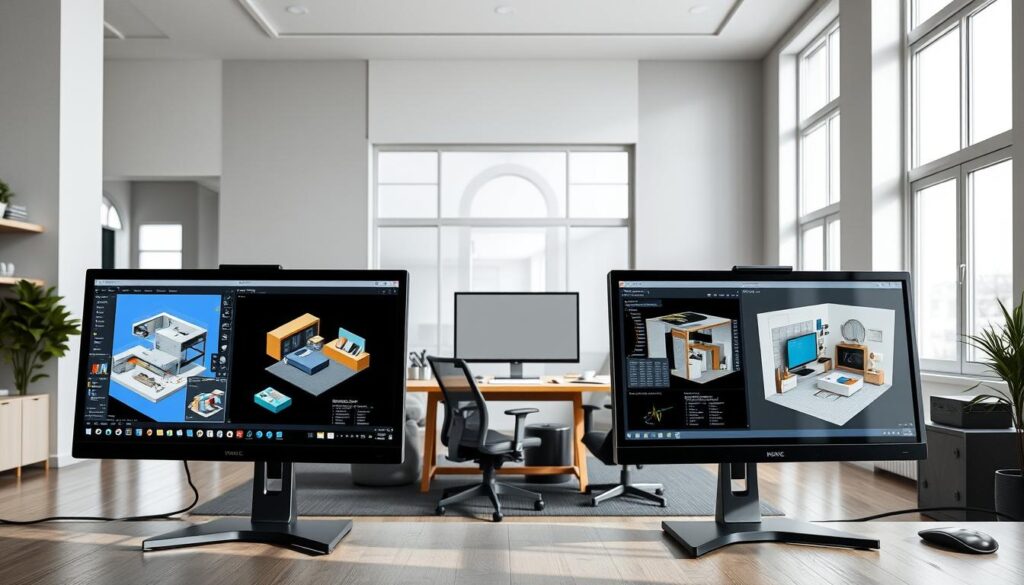
Advantages of Free Software
Free 3D interior design software is great for beginners or those on a tight budget. It offers basic features for simple designs and layouts. One big plus is that you can try it out without spending money. But, free versions often have fewer options and may have watermarks on your designs.
Still, some free software is quite powerful. SketchUp Free and RoomSketcher are examples. They have tools for detailed designs. Some free software also lets you buy more features later.
Benefits of Investing in Paid Software
Paid 3D interior design software has more tools and features. It gives you access to lots of objects, materials, and textures for detailed designs. It also has advanced features like 3D rendering and VR. Plus, you can share designs easily.
Paid software also has better customer support and regular updates. It’s perfect for professionals. It boosts productivity and design quality. AutoCAD and Chief Architect are top choices for pros.
So, choose based on your needs and goals. Free software is good for hobbyists or beginners. But, if you need advanced features, paid software is the way to go.
How to Choose the Right Software for Your Needs
Finding the right 3D interior design software is key to reaching your design goals. It begins with knowing your skill level and needs. Whether you’re starting out or are a pro, the software should match your goals.
Assessing Your Skill Level
First, figure out your skill level in design software. If you’re new, look for software that’s easy to use and has good tutorials. More experienced designers might want software with advanced features and customization options.
- For beginners, RoomSketcher is great because it’s easy to use and has lots of objects.
- Professionals might prefer AutoCAD for its detailed features and precision.
Considering Your Design Goals
What you want to achieve with your design is also important. Do you need to make detailed floor plans or 3D models? Some software, like SketchUp, is great for 3D models, while others are better for 2D drafting.
“The right software can make all the difference in bringing your design vision to life.” – Design Expert
Evaluating Software Compatibility
Lastly, think about how well the software works with your current tools. Make sure it can export files in formats you use. This will help your workflow and avoid problems later.
- Check if the software works with your operating system (Windows, macOS, etc.).
- See what file formats it can import and export.
- Look into any extra plugins or integrations you might need.
By looking at your skill level, design goals, and software compatibility, you can choose wisely. Whether you need interior design software for beginners or professional interior design software, there’s something out there for you.
Tips for Getting Started with 3D Design Software
Starting with 3D design software can seem tough, but it’s easier than you think. Learning the basics of easy 3D design tools and 3D room planner apps is key. This will help you use these programs with ease.
Familiarize Yourself with the Interface
Understanding the interface of a virtual interior design program is crucial. Spend time exploring menus, tools, and features. Most 3D design software is designed to be easy to use, with interfaces that help you find what you need quickly.
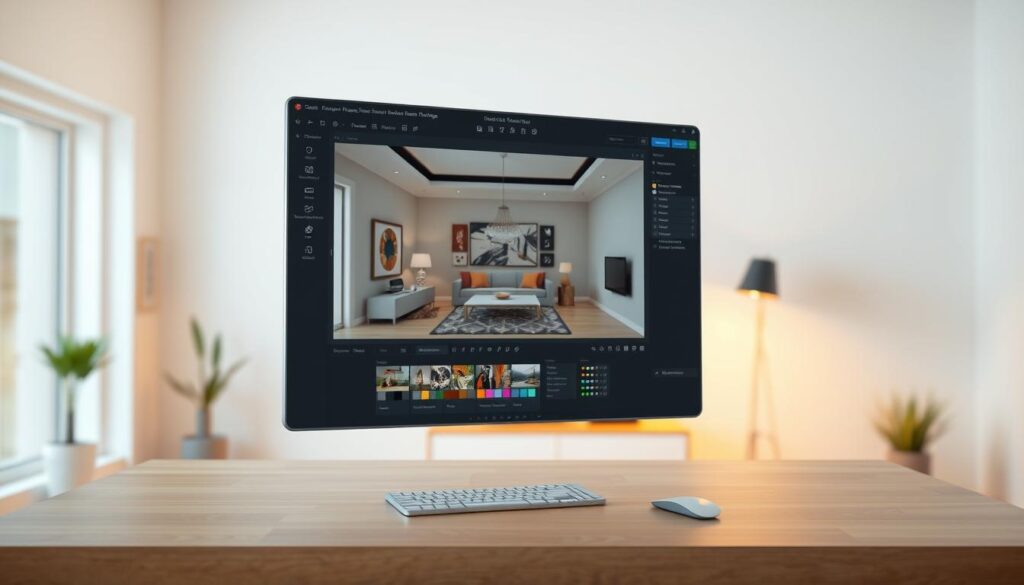
Start with a Template
Using a template is a great way to begin with 3D design software. Templates offer a pre-made layout that you can customize. This is super helpful for beginners, as it lets you learn the software’s features without starting from scratch.
Utilize Tutorials and Online Resources
Tutorials and online resources are essential when learning a new 3D room planner app or easy 3D design tool. Many programs have built-in tutorials that teach you the basics and more. Online forums, YouTube tutorials, and blogs also offer tips and tricks from experts.
| Resource | Description | Benefit |
|---|---|---|
| Built-in Tutorials | Step-by-step guides within the software | Helps you understand the software’s capabilities |
| YouTube Tutorials | Video guides created by experienced users | Provides visual learning and practical tips |
| Online Forums | Communities where users share knowledge and experiences | Offers support and solutions to common problems |
By following these tips, you can quickly learn to use 3D design software. This will unlock your creative potential and help you bring your design ideas to life.
How to Maximize Your Design Software
Getting the most out of your 3D design software can really improve your interior design work. By using advanced tools like plugins, 3D rendering, and design sharing, you can elevate your designs.
Exploring Plugin Options
Plugins are a great way to boost your advanced 3D modeling software. They can automate tasks, create complex designs, and connect with other software. For example, plugins can add textures, models, and effects to your designs.
Some popular plugins include:
- Additional modeling tools
- Advanced rendering capabilities
- Integration with other design software
Utilizing 3D Rendering Features
3D rendering is key in top 3D design software. It lets you make images that look real. Using these features, you can show your designs in a more engaging and realistic way. This is great for showing your work to clients or stakeholders.
| Rendering Feature | Description | Benefit |
|---|---|---|
| High-Dynamic-Range Imaging | Captures a wider range of tonal values | More realistic images |
| Global Illumination | Simulates the way light interacts with scenes | More accurate lighting |
| Ambient Occlusion | Adds depth and realism by simulating ambient light | Enhanced detail |
Sharing Your Designs
Sharing your designs is a crucial step. Most virtual interior design programs let you share in many ways. You can export files, send via email or cloud storage, or create interactive 3D models.
Sharing your designs well helps you work better with clients and stakeholders. You can get feedback and deliver better designs.
Integrating 3D Design in Your Home Renovation
Homeowners can now see their renovation ideas come to life with 3D design software. This tool lets us try out different layouts, colors, and furniture without making any real changes.
Planning Layouts Effectively
3D interior design software helps us plan our layouts better. We can make a detailed floor plan and see it in 3D. This makes it easier to spot problems and make changes.
Visualizing Color Schemes
Choosing the right colors is key in any renovation. With 3D design software, we can test different colors under various lights. This helps us pick the best option.
Choosing Furnishings and Decor
Finding the right furniture and decor can be tough. But 3D interior design software makes it easier. We can try out different pieces virtually, ensuring they fit and match our style.
Using easy 3D design tools in our renovations helps us achieve our dream home. Whether we’re using interior design software for beginners or advanced tools, the fun is in experimenting and exploring.
Case Studies: Successful Designs Using Software
The power of 3D interior design software is shown in real-life examples. Homeowners and designers use top 3D design software to see and improve their ideas before they start.
A Modern Kitchen Transformation
A homeowner used professional interior design software to update their old kitchen. They tried out different layouts, materials, and lights. This led to a sleek and useful kitchen.
They made a 3D model of the kitchen and picked materials and finishes. They also saw how the space looked with different lights. The result was a kitchen that was modern and met their needs.
An Open-Concept Living Room
An open-concept living room was transformed with advanced 3D modeling software. The software helped the designer try out furniture and decor. This ensured a space that was both harmonious and welcoming.
The software let the homeowner see how the design elements worked together. The final design was a spacious and inviting area that fit their lifestyle perfectly.
Creating a Cozy Bedroom Retreat
A cozy bedroom retreat was designed using 3D interior design software. The designer played with colors, furniture, and textures to create a warm space.
The designer used the software to see the space and make changes as they went. This ensured the design met the client’s wishes. The result was a peaceful and comfortable bedroom.
Future Trends in 3D Interior Design Software
3D interior design software is getting better and easier to use. New trends are changing the game. They promise to make design more advanced and fun.
Incorporating Virtual Reality
Virtual reality (VR) is a big deal in 3D design. It lets users dive into their designs. This makes them feel like they’re really there.
With VR, designers can see their work in a new way. They can make better choices.
AI in Interior Design
Artificial Intelligence (AI) is also making waves. It helps with boring tasks and gives design ideas. AI even predicts what’s next in design.
This makes design faster and more exciting. Designers get to try new things.
Collaboration Features
The future is all about working together. Collaboration features are key. They let teams work together, no matter where they are.
Now, designers can share ideas and get feedback right away. This makes teamwork better.
| Trend | Description | Benefit |
|---|---|---|
| Virtual Reality | Immersive design experience | Better visualization |
| AI in Design | Automated tasks and design suggestions | Increased productivity and creativity |
| Collaboration Features | Real-time collaboration and feedback | Enhanced teamwork and communication |
Conclusion: Elevate Your Design Experience
3D interior design software has changed how we design homes. It lets you turn your ideas into reality and create amazing spaces.
Key Takeaways
Using 3D interior design software has many benefits. You can see your space come to life, save time and money, and make changes easily. The right tool can help you reach your design goals, no matter if you’re a pro or a DIY lover.
Getting Started
Now you know why 3D interior design software is great. It’s time to start designing. Look into different options, from free to paid, and pick what works best for you. With this software, you can unleash your creativity and make spaces that show off your style.

